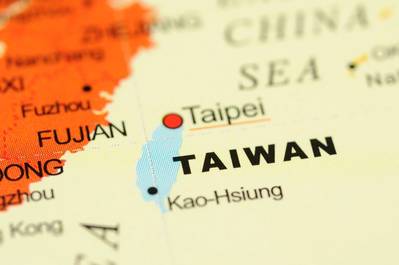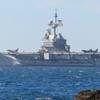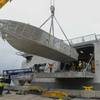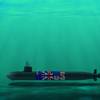Taiwan Expects to Deploy Two New Submarines by 2027
Taiwan hopes to deploy at least two new, domestically developed submarines by 2027, and possibly equip later models with missiles, to strengthen deterrence against the Chinese navy and protect key supply lines, the head of the program said.
Taiwan, which China claims as its own territory, has made the indigenous sub program a key part of an ambitious project to modernise its armed forces as Beijing stages almost daily military exercises to assert its sovereignty.
President Tsai Ing-wen, who initiated the program when she took office in 2016, is expected to launch the first of eight new submarines on Thursday under a plan that has drawn on expertise and technology from several countries - a breakthrough for diplomatically isolated Taiwan.
Admiral Huang Shu-kuang, Tsai's security adviser, who is leading the program, said a fleet of 10 submarines - which includes two Dutch-made submarines commissioned in the 1980s - will make it harder for the Chinese navy to project power into the Pacific.
"If we can build up this combat capacity, I don't think we will lose a war," Huang this month told an internal briefing on the project, which was attended by Reuters.
Huang said the first submarine, with a price tag of T$49.36 billion ($1.54 billion), will use a combat system by Lockheed Martin Corp (LMT.N) and carry U.S.-made MK-48 heavyweight torpedoes. It will enter sea trials next month before delivery to the navy by the end of 2024.
For subsequent models, Taiwan will leave space for submarine-launched anti-ship missiles, but adding those weapons depends on production availability in a U.S., where capacity was already tight, Huang said, without naming the companies that might be involved.
He called the submarines a "strategic deterrent" to Chinese warships crossing the Miyako Strait near southwestern Japan or the Bashi Channel that separates Taiwan from the Philippines.
Huang said Taiwan's diesel-electric submarines can keep China at bay within the first island chain, referring to the area that runs from Japan through Taiwan, the Philippines and on to Borneo, enclosing China's coastal seas.
"This was also the strategic concept of the U.S. military - to contain them within the first island chain and deny their access," Huang said. "If Taiwan is taken, Japan will definitely not be safe, South Korea will definitely not be safe."
China's defence ministry did not respond to a request for comment.
The Chinese navy, including its Shandong aircraft carrier, has become increasingly active in recent months off Taiwan's eastern coastline, prompting worries that China could launch an attack from that direction. Eastern Taiwan is where planners have long envisioned the island's military regrouping and preserving its forces during a conflict.
Huang said the submarines can help maintain the island's "lifeline" to the Pacific by keeping ports along Taiwan's eastern coast open for supplies in a conflict.
"The submarines will keep their ships away from our eastern shores," he said.
Chieh Chung, a military researcher at Taiwan's National Policy Foundation think tank, said the fleet would have trouble with that task, because China could position warships in the Pacific before launching an attack.
But he added that the submarines could occupy strategic ambush points in the region and "greatly harm (China's) combat ability" by targeting high-value ships such as carrier groups or landing fleets.
'Great help'
Taiwan has quietly sourced technology, components and talent from at least seven nations to help it build submarines, a Reuters investigation has found.
Getting foreign assistance was particularly challenging for Taiwan, which doesn't have official ties with most countries.
Huang declined to say which countries had approved export permits, but said he had reached out to generals from countries that included the United States, Japan, South Korea and India.
"For those foreign generals who agreed with my ideas, they helped convey the message to their governments or arrange meetings," he said. "I told them our needs and that's how we achieved our purpose of securing export permits."
Huang also expressed thanks for the "great help" from a team led by an unnamed retired rear admiral of Britain's Royal Navy, who secured export permits from Britain through a Gibraltar-based company.
Britain sharply increased the amount of submarine parts and technology exports approved last year for Taiwan, a Reuters analysis of the data showed.
Huang described the program as "even harder than reaching the sky," pointing to challenges such as a global chip shortage that hit many manufacturers around the world. He said his team scrambled to source chips from Taiwan to avoid delays by foreign vendors.
A foreign supplier had also pull out at the last minute after the work with Taiwan was leaked to a Chinese embassy, he said, without elaborating.
He said China's frequent military harassment, including close approaches to Taiwan's territorial waters and airspace, has prompted Taiwan and the United States to rethink the island's "asymmetrical" strategy of making its forces more mobile and harder to attack, with a focus on smaller weapons systems.
"The American thinking is changing gradually. They realised that you can't withstand (the harassment) without bigger boats," Huang said, pointing to the navy's plan to build a new generation of bigger frigates.
"They are getting closer and closer," he added, referring to China. "Taiwan can't drive them out with small boats. We must use bigger boats."
($1 = 31.9840 Taiwan dollars)
(Reuters - Reporting By Yimou Lee. Editing by Gerry Doyle)











